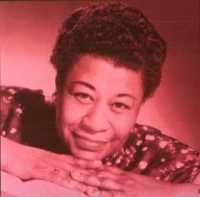Few artists stand as the very definition of the art they practice, but Ella Fitzgerald is one of them. No jazz singer can avoid being influenced by her, or at least taking into account the monument of her work. Fitzgerald didn't have the darkness of Billie Holiday, the bravura of Sarah Vaughan or the acidity of Carmen McRae, but what she did have was a suniness, a childlike joy and a classic command of her craft that audiences picked up on right away. Originally influenced by Connie Boswell, she also swung like mad, and was one of the few singers revered by jazz instrumentalists. Her scat singing, which soared through a three-and-a-half octave range, was flexible, creative and a sure crowd-pleaser.
Fitzgerald's career spanned 60 years. Born in Newport News, Va., on April 25, 1918, she broke into the music business by winning a 1934 talent show at Harlem's Apollo Theatre, then joined Chick Webb's driving band, becoming his featured vocalist at the Savoy Ballroom. In 1938 she had her first big hit, a novelty tune based on a nursery rhyme, "A Tisket A Tasket," followed by "Undecided," in 1939. When Webb died that year, Fitzgerald led the band until 1942, then launched a solo career.
Beginning in 1946, she was the star vocal attraction on the legendary Jazz At The Philharmonic shows, organized by Norman Granz, who also became her manager. Fitzgerald's albums for Granz's labels (Verve, Pablo), beginning in 1956, led her to the popular "songbook" projects, in which she devoted each set to an American songwriter, such as Duke Ellington, George Gershwin, Irving Berlin and Harold Arlen. The albums widened her fame, making her one of a handful of jazz musicians who is a household name in America, as well as helping to define what is now referred to as the Great American Songbook. Her duo albums with guitarist Joe Pass are among the most satisfying jazz recordings ever made.
Though she sang solidly in a swing-to-bop mode, Fitzgerald never seemed to go out of style, gathering fans from each succeeding generation. In the 1960s, she filled college auditoriums full of student rebels and appealed to lounge lizards in the '90s. Fitzgerald died on June 15, 1996.
In 1979, Fitzgerald was elected by the Readers into the Down Beat Hall of Fame.
Source: http://www.downbeat.com/sections/artists/text/bio.asp?from=fans&id1=3741
